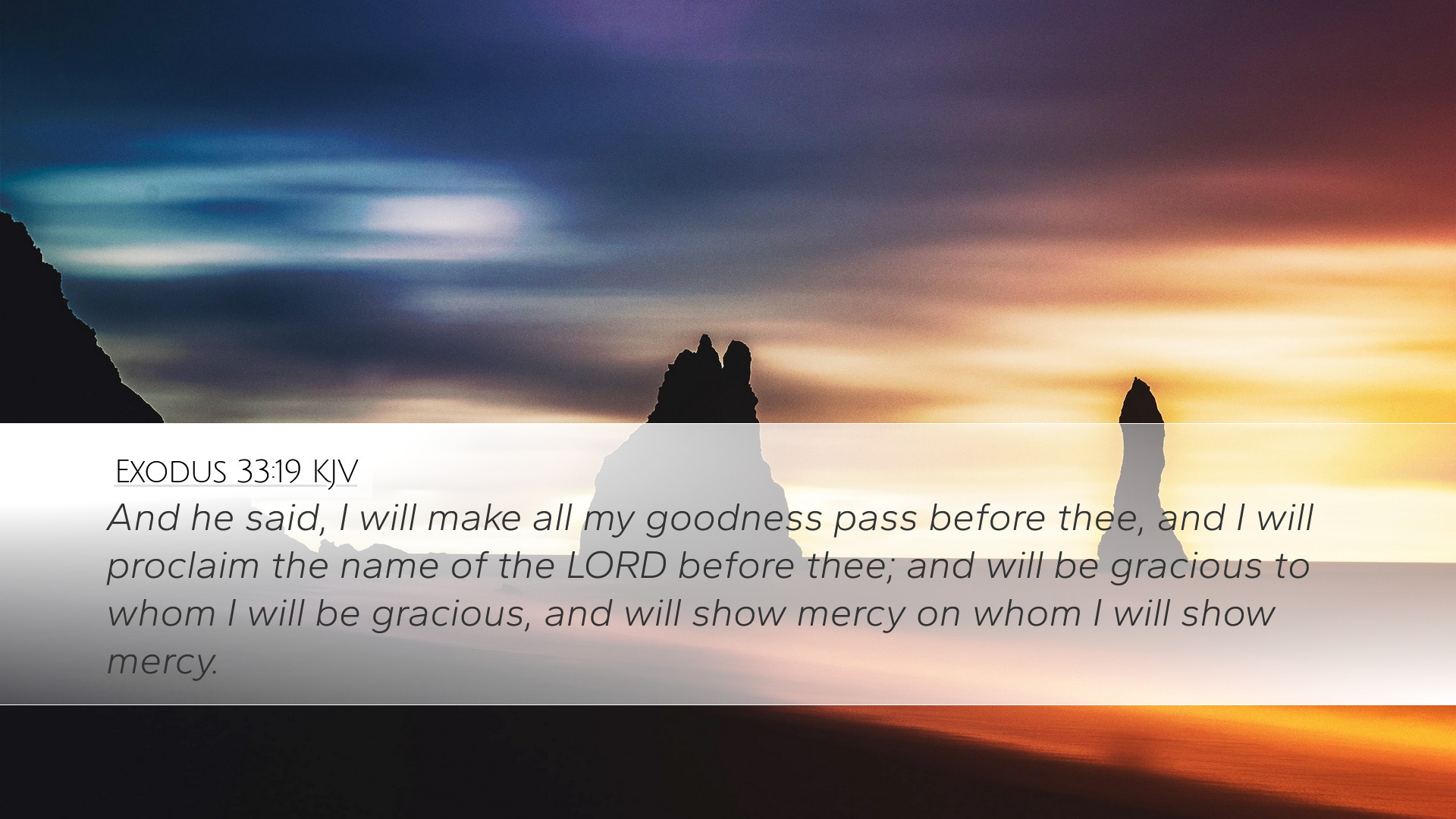Exodus 33:19 - A Divine Revelation
Verse: "And he said, I will make all my goodness pass before thee; and I will proclaim the name of the LORD before thee; and will be gracious to whom I will be gracious, and will show mercy on whom I will show mercy." - Exodus 33:19
Contextual Analysis
This verse is set within the narrative of Moses' intimate relationship with God. After the Israelites' sin with the golden calf, Moses intercedes for them, seeking God’s presence and forgiveness. It is during this critical moment that God reveals aspects of His own nature to Moses, demonstrating His goodness and sovereign grace.
Insights from Public Domain Commentaries
Matthew Henry's Commentary
Henry emphasizes the significance of God's goodness being revealed. He highlights that God's declaration of His goodness is not merely for Moses' enjoyment, but for the benefit of the Israelites and their understanding of God’s character.
- The Essence of Goodness: God's goodness encompasses His mercy, grace, and compassion. It signifies His active commitment to care for His people.
- The Sovereignty of God: Henry notes that God's prerogative to be gracious and merciful is rooted in His sovereignty. It underlines that divine favor is not based on human merit but on God’s will.
- Invitation to Experience: The declaration invites believers to recognize and experience God’s goodness personally. Moses, as a leader, is called to reflect this character of God to his people.
Albert Barnes' Notes on the Bible
Barnes reflects on the individual nature of God’s revelation to Moses and the implications of His name. He interprets this passage as a profound statement about the nature of God, particularly in His relationships with humanity.
- The Manifestation of Character: "I will proclaim the name of the LORD" signifies an unveiling of God's attributes. God's name encapsulates all His attributes: holiness, justice, righteousness, and mercy.
- The Principle of Divine Mercy: Barnes explicates the phrase "I will be gracious to whom I will be gracious," indicating that mercy is a divine prerogative exercised by God according to His sovereign will, not human expectation.
- Understanding of Divine Favor: The assurance of God’s goodness to Moses serves to strengthen him for the leadership task ahead, illustrating how the experience of divine favor equips leaders for their roles.
Adam Clarke's Commentary
Clarke brings forth a rich theological understanding of God's attributes as depicted in this verse. He emphasizes the relational aspect of God's interaction with Moses.
- The Dual Nature of God’s Revelation: Clarke suggests that God's revelation is twofold: a passing of His goodness and a declaration of His name, both serving to deepen the understanding of God’s relational nature.
- Grace and Mercy: He elaborates that God's graciousness and merciful attributes are essential to the covenant relationship with His people. Understanding these attributes is vital for spiritual growth and communion with God.
- The Importance of Divine Presence: Clarke points out that God's assurance to Moses highlights the necessity of divine presence in leadership. It emphasizes that understanding God's nature is critical for spiritual guidance.
Theological Implications
This verse holds profound theological implications that extend far beyond its immediate context. It invites reflection on God's character and the nature of His relations with humanity.
- God's Nature: The essence of God's goodness speaks to His innate desire to act in love toward His creation. This intrinsic goodness forms the basis of the believer’s hope and assurance.
- The Role of Grace: The divine prerogative of grace signifies God’s sovereignty in salvation and human relationships. It challenges believers to recognize that they do not earn merit before God.
- Human Response: Understanding God's nature calls for an appropriate human response of worship, obedience, and the pursuit of holiness, reflecting God’s goodness in the lives of believers.
Practical Applications
The richness of Exodus 33:19 offers a variety of practical applications for pastors, students, theologians, and scholars:
- Encouragement in Leadership: Leaders can draw strength and assurance from the knowledge of God’s goodness, which equips them to lead with grace and integrity.
- Teaching God’s Nature: This verse can serve as a foundation for teaching on the attributes of God. Believers are called to embrace and reflect God’s goodness in their relationships.
- Emphasis on Prayer and Intercession: The context of Moses interceding for the Israelites serves as a reminder of the importance of prayer, both individually and corporately, for God’s mercy in our communities.
- Personal Reflection: Individuals are encouraged to reflect on how they experience and respond to God’s grace and mercy in their lives, fostering a deeper relationship with their Creator.
Conclusion
Exodus 33:19 provides a glimpse into the heart of God, showcasing His goodness and sovereignty. By engaging with this passage, individuals can gain deeper insights into the nature of God as loving, gracious, and merciful, fostering both personal and communal growth in understanding and reflecting God's character.


